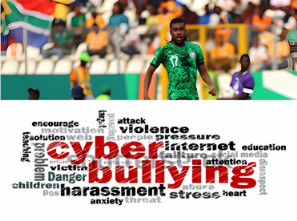By Oluwaseyi Ajadi
The proliferation of Information and Communication Technology (ICT) has undeniably revolutionized lifestyles worldwide. Yet, a dark side of the internet revolution has surfaced: cyberbullying.
RELATED: Police to monitor social media; prosecute for hate speech and cyberbullying
Cyberbullying, defined as the use of electronic communication to harass, threaten, or degrade people, has become disturbingly common in Nigeria, severely affecting the mental health of its victims.
The recent wave of cyberbullying targeting Nigerian footballer Alex Iwobi, resulting in him deleting all his pictures on Instagram, highlights the urgent need for collective action to address this epidemic. This incident underscores the toxic culture of cyberbullying that plagues our digital landscape. Asisat Oshoala’s vocal condemnation of this behavior serves as a rallying cry for society to confront this menace head-on.
Cyberbullying perpetuates a culture of cruelty and intolerance
Cyberbullying not only inflicts emotional harm on its victims but also perpetuates a culture of cruelty and intolerance that undermines the fundamental principles of respect and empathy.
It is imperative that we recognize cyberbullying as a serious social issue with far-reaching consequences. Beyond the immediate impact on individual victims, cyberbullying contributes to the erosion of trust and civility in our online communities. It breeds fear and insecurity, stifling meaningful discourse and driving individuals away from participating in digital spaces essential for social connection and engagement.
In addition to the cyberbullying faced by Alex Iwobi, it’s crucial to shed light on another distressing incident that recently rocked Nigeria’s digital sphere. Veekee James, one of the nation’s top fashion designers, found herself the target of vicious attacks simply because of her choice to celebrate her wedding day in a manner true to her own joy and identity. Careless speeches, filled with hateful words and curses, were hurled at her, illustrating the ugly underbelly of online behavior.
The onslaught against Veekee James serves as a stark reminder of the insidious nature of cyberbullying and its ability to permeate even the most joyous occasions. The freedom to express oneself, especially during significant life milestones such as a wedding, should be celebrated and respected. Yet, in the face of unwarranted criticism and vitriol, the very essence of this freedom is undermined, leaving individuals vulnerable and disheartened.
Cyberbullying now a worrisome issue in Nigeria
The present study sought to establish that cyberbullying is a worrisome issue in present-day Nigeria with negative implications for the psychological well-being of victims. Despite the existence of laws and policies aimed at curbing cyberbullying, implementation remains a significant challenge in Nigeria. Accurate data on its extent are difficult to obtain due to underreporting, especially when it occurs outside controlled environments. Victims often suffer in silence every day because they feel there is no need to report the problem, and even when they do, they feel that nothing could be done. Tragically, this silence can prove deadly, as the psychological scars inflicted by cyberbullying deepen, leading some to contemplate or even attempt self-harm. The absence of empirically-based prevention and intervention strategies exacerbate the problem, leaving many vulnerable individuals without adequate support.
In recent years, social media usage has significantly increased, partly due to the availability of reasonably priced smartphones and data plans. Due to the democratization of information access brought about by technical advancement, people from all backgrounds can now engage in online community building and discourse. Social media platforms function as digital communities that provide Nigerians with a sense of identity and belonging by connecting them based on common interests, hobbies, or geographic location.
Nigeria’s Internet presence
As of January 2023, Nigeria has a total population of 221.2 million. Internet penetration in the country was 55.4 percent, with 122.5 million internet users. Additionally, 31.6 percent of social media users were in Nigeria, accounting for 14.3 percent of the total population.
Furthermore, the number of cellular mobile connections reached 193.9 million, representing 87.7 percent of the total population. Breaking down the population by age group, 16.1 percent were between 0 and 4 years, 21.9 percent were between 5 and 12 years, 11.6 percent were between 13 and 17 years, 13.1 percent were between 18 and 24 years, and 13.6 percent were between 25 and 34 (Kemp, 2023). In terms of social media usage, 25.8 percent of Nigeria’s internet users engaged with at least one social media platform. Of the social media users, 44.7 percent were female and 55.3 percent were male. Facebook had 21.75 million users, YouTube had 31.6 million users, Instagram had 7.1 million users, Facebook Messenger reached 3.5 million users, LinkedIn had 7.5 million members, Snapchat had 12.35 million users, and Twitter had 4.95 million users in Nigeria as of January 2023. There are fluctuations in the potential ad reach of these platforms between 2022 and 2023. For example, Facebook’s potential ad reach decreased by 16.7 percent, YouTube decreased by 4.0 percent, Instagram decreased by 21.5 percent, Facebook Messenger decreased by 13.6 percent, LinkedIn increased by 19.0 percent, Snapchat increased by 30.0 percent, and Twitter increased significantly by 1,421 percent (Kemp, 2023).
Social media has emerged as a transformative force in Nigeria. From amplifying grassroots movements to providing platforms for citizen journalism and activism, social media has empowered Nigerians to voice their opinions, hold authorities accountable, and mobilize for collective action. The #EndSARS protests of 2020, which originated and gained momentum on social media, exemplify the potential of digital platforms to drive socio-political transformation and advocate for justice and accountability. Alongside its undeniable benefits, social media also presents formidable challenges, which include cyberbullying.
Fight against cyberbullying is collective responsibility
To combat this scourge effectively, concerted action is urgently needed. Firstly, there must be a concerted effort to enforce existing legislation aimed at protecting individuals from cyberbullying. This requires collaboration between law enforcement agencies, educational institutions, and online platforms to ensure swift and effective responses to reports of online harassment. Additionally, proactive measures such as digital literacy programs should be prioritized in schools to teach students about the responsible use of technology and ethical considerations of online behavior, and mental health support services should be implemented to empower individuals to navigate the online world safely and seek help when needed.
Ultimately, the fight against cyberbullying is a collective responsibility that requires the involvement of individuals, communities, and institutions at all levels of society. By standing together against cyberbullying, we can create a safer, more inclusive digital environment where all individuals can participate freely without fear of harassment or intimidation.





























